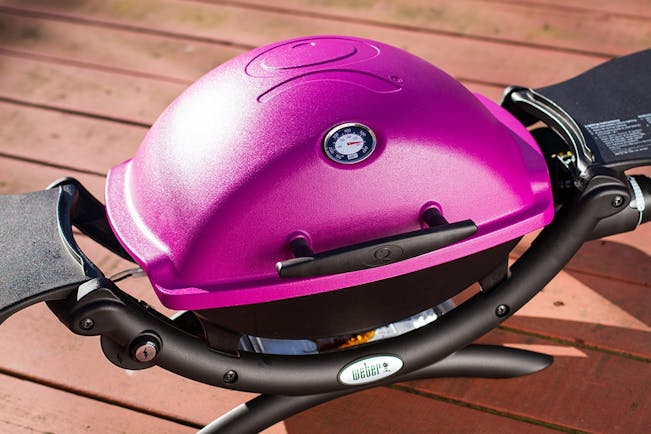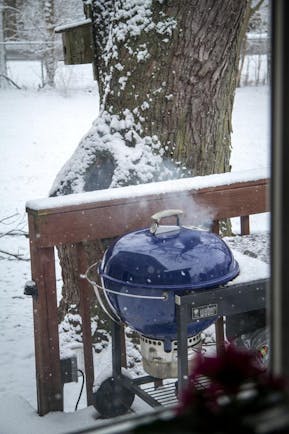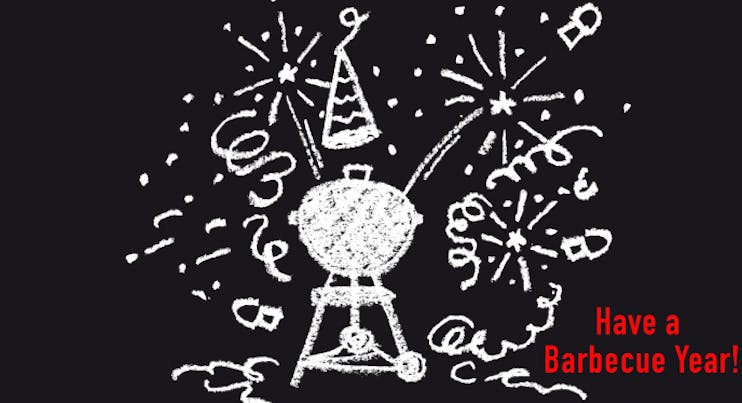Save on select Weber Works™ Accessories* Shop Now.
Preparing Your Grill For Storage
Weber grills can be used 365 days a year, but that doesn’t mean that everyone necessarily wants to use them in the winter. Here in Chicagoland, braving the bone-chilling winters that Mother Nature so lovingly provides can be a bit daunting. If grilling during the cold winter months is not for you, here are a few things to keep in mind before putting it away.
Critters
It’s not unheard of for wildlife, especially mice, to decide that an unused grill would be a perfect place to create a nice home for the winter. The lid provides a great roof to protect them from the elements, and leftover bits of grilled meals make for a nice supply of food. If your grill is going to remain outside over the winter, it’s even more important to clean out the inside.
For gas and electric models, use a grill brush to brush the grates, flavorizer bars, and burners clean and scrape all the interior surfaces with a putty knife. Push all the loose debris into the slide-out grease tray and into the disposable drip pan. Then be sure to empty the disposable drip pan!
For charcoalmodels, make sure to brush the cooking and charcoal grates clean. After that, scrape the interior surfaces with a putty knife and push all of the loose debris into the ash catcher below the bowl of the kettle. Then empty the ash catcher.
The idea is that you want to remove as much grease and food residue as possible, as it attracts unwelcome wildlife.
If you’re unlucky enough to open your grill in the spring and find that some critters used it as their winter home, don’t panic. Just clean out whatever presents they’ve left, light up the grill, and let it run on high for at least 15 minutes to clean the inside.
Mold
The same conditions that can make a grill attractive to wildlife also make for an ideal environment for mold to grow. Mold typically doesn’t grow at temperatures below freezing, but the last weeks of fall and first weeks of spring can have temperatures that are very appealing to mold.
Since mold grows and feeds on organic matter, and leftover food and grease are exactly that, the inside of a dirty grill is a perfect place for it to grow. Cleaning out the inside of the grill will greatly diminish the chances for mold to develop.
If you happen to find mold in your grill, don’t panic. Clean out the mold by scraping it off of any surfaces it has grown on, and let your grill run on high for at least 15 minutes before grilling on it.
Corrosion & Oxidation
Leaving grease and food residue in the grill over the winter can trap moisture, which can promote the development of corrosion and oxidation. Cleaning your grill before any lengthy period of time when it won’t be used, will help reduce the chances that corrosion or oxidation will develop on the grill components, which will prolong the life of the grill.
Storing Your Grill
Weber grills don’t need to be brought inside for the winter, but doing so definitely won’t hurt anything. Just make sure that if you have a grill that runs on propane, that you leave the tank outside.
NEVER store a propane tank indoors. If you are going to leave your grill outdoors for the winter, a grill cover can help keep the exterior surfaces clean.
Grilling should always be about having fun, but a little bit of maintenance will go a long way towards making sure it stays that way. Keep your grill clean and you’ll be much less likely to experience the issues I mentioned and you’ll also be much happier to be reunited with your grill in the spring!



